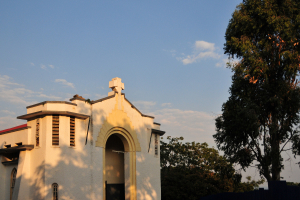When Caesar and Christ Collide
The Cross & the Crown
In Uzbekistan, a regional government has just ordered religious leaders to do a better job of preventing "undesirable actions"— translate that: Christian missionary activity. The Becket Fund for Religious Liberty says Uzbek churches have been warned that all religious gatherings will be under careful observation by the government.
Well, that's Uzbekistan, you say. A former Soviet republic, now a tin-pot dictatorship. That kind of state encroachment on religion would never happen here in the United States, the land of the free.
Think again.
Three years ago, for example, the California Supreme Court upheld a state law requiring that Catholic Charities, a religious employer, violate its church's teachings by including contraceptive coverage in its health plans. This was a clear intrusion into a religious body's expression of its religious precepts and sense of mission.
But this is what happens when Caesar and Christ collide—something that's occurred ever since Christ walked the earth.
As I write in my new book, God & Government, conflicts between religious conscience and political mandates are unavoidable. Both church and state assert standards and values. Both seek authority; both compete for, in the case of God, ultimate allegiance, and sometimes in the case of the state as well.
The conflict is especially apparent in the Judeo-Christian tradition. The assertion that God is King has been an offense to the proud and the powerful for millennia—and one of the reasons Jews and Christians alike have been systematically persecuted.
During the first centuries after Christ, Christians were martyred not for religious reasons (after all, Rome was a land of many gods), but because they refused to say, "We have no king but Caesar." Thus the Roman government saw Christians as political subversives—subject to flogging, imprisonment, and execution.
Down through the centuries, through the reign of Constantine, the Crusades, the Reformation, the French Revolution, church and state have often violently clashed—usually when the Church sought to wield worldly power or when the state sought to suppress the spiritual authority of the Church.
You see, as the Bible makes clear, both church and state have clear and distinct roles ordained by God. The Church's is to make visible the kingdom of God. The state's is to restrain evil and preserve order. The issue is how to apply these teachings to each institution in today's volatile world.
Modern—and terrifying examples—of the state overstepping its bounds are easy to find: the suppression of the Church in Nazi Germany and the Soviet Union, and in much of the Islamic world church and state are seen as one.
Here in the U.S., the state's encroachment on faith is more subtle, but no less insidious: Be it medical students having to learn how to perform abortions, Christian pharmacists forced to dispense morning-after pills, or zoning boards banning in-house Bible studies.
The record of the centuries, however, ought not to cause us to despair. Tension between church and state is inevitable. But both operate under God's rule, each in a different relationship to that rule.
Our job is to understand these distinctions and then remind our neighbors, our legislators and our pastors of what is so important: that the church and state remain true to their respective roles.
As Jesus put it so plainly, we must render to Caesar what is Caesar's, and to God what is God's.
_________________________________________________
From BreakPoint®, June 8, 2007, Copyright 2007, Prison Fellowship Ministries. Reprinted with the permission of Prison Fellowship Ministries. All rights reserved. May not be reproduced or distributed without the express written permission of Prison Fellowship Ministries. "BreakPoint®" and "Prison Fellowship Ministries®" are registered trademarks of Prison Fellowship Ministries




























